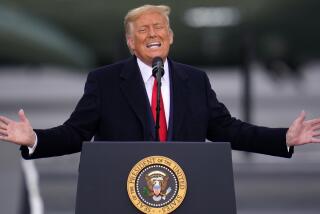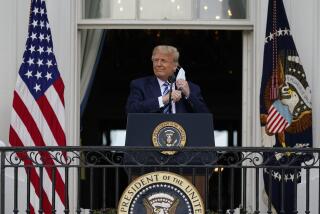Trump, who tied himself to stock market when it rose, struggles to respond to its plunge

- Share via
WASHINGTON — President Trump, in defiance of precedent and warnings from advisors, repeatedly has tied his political fortunes to the stock market, taking credit for three years of steady growth and pointing to people’s healthy 401(k) accounts as he makes his case for reelection.
As the market plunged on Monday, ending with the Dow Jones industrial average down nearly 8%, the president struggled to respond — tweeting the usual attacks on Democrats, attending a fundraiser in Florida and generally downplaying the rising public health emergency, projecting a determined and wishful calm increasingly at odds with an agitated public.
After meeting Monday afternoon with advisors, Trump appeared in the White House briefing room alongside members of the administration’s coronavirus task force and said that he would meet with lawmakers Tuesday about taking “very major” actions to mitigate the impact, including a possible payroll tax cut and additional steps to provide relief for affected industries and small businesses and employees being forced to stay home from work.
“It’s not their fault, it’s not our country’s fault,” he said, glumly. “It’s something we were thrown into. We’re handling it and we have been handling it.”
“This blindsided the world, and I think we’ve handled it very, very well,” he added.
Trump left after just a few minutes and without taking questions, leaving Vice President Mike Pence and health officials behind to deliver the administration’s guidance to the public about how best to avoid the virus and slow its spread.
Roughly a million tests for the coronavirus have been distributed and are now available “in every state,” Pence said. But Health and Human Services Secretary Alex Azar could not say how many Americans had so far been tested.
Treasury Secretary Steven T. Mnuchin also addressed the economic fallout, downplaying concerns about a recession and saying the market’s dramatic decline Monday was “obviously” tied to the drop in oil prices. He also confirmed that Trump would meet later in the week with Wall Street executives.
These new, stepped-up efforts to acknowledge and respond to a growing public health, economic and political threat come as some of Trump’s outside allies and advisors have grown more concerned about his stubborn projection of nonchalance.
“He’s a wartime president now, and he has to get into that mode,” said Steve Cortes, a spokesman for the pro-Trump America First PAC and a former Wall Street trader and analyst. “The enemy isn’t a foreign country, it’s a virus. We need a commander in chief who is really front and center, warning about risks and being transparent about the risks, but also reassuring the people that America can handle this.”
Transparency, reassurance and steadiness, however, have never been traits at which Trump excels, and in dealing with the current crisis, he faces several problems that he’s not accustomed to.
One is that after three constantly chaotic and controversial years in the White House, the president’s power to move Wall Street with his words alone has greatly diminished.
Trump has the largest Twitter megaphone in the world, with 73.5 million followers. But his impact on the markets is notably less than it was.
A September study by Bank of America Merrill Lynch found that on days Trump tweets more than 35 times, the stock market — as measured by the S&P 500 — is likely to fall. Market returns are more likely to increase on days when he tweets fewer than five times. The study looked at tweets since 2016 without regard to specific content.
Barrons found similar results in a separate study while also noting the impact of Trump’s tweets tended not to last long, wearing off within 10 trading sessions.
“Markets are forward looking and today they look terrified,” said Justin Wolfers, a professor of economics and public policy at the University of Michigan and an administration critic. “The markets are making a joint bet about how the virus plays out and how it affects the economy. It’s probably a bet on their lack of confidence that the government is going to manage this well.”
A second problem is that despite the president’s repeated assurances that the spread of the disease has been contained, its impact has begun to hit people in his own circle — since Sunday, five conservative Republican members of Congress, including Trump’s newly announced White House chief of staff, Rep. Mark Meadows (R-N.C.), have announced that they are quarantining themselves after coming into contact with a man at the annual Conservative Political Action Conference last week who has since tested positive for the virus.
Rep. Doug Collins (R-Ga.), who was among the group, had a long handshake and chat with Trump on Friday before the two toured the headquarters of the Centers for Disease Control and Prevention in Atlanta. Another, Rep. Matt Gaetz (R-Fla.), spent time with Trump on Air Force One on Monday, flying back from a fundraising event in Orlando, Fla., then announced his self-quarantine after arriving in Washington.
As health officials warned the public to avoid shaking hands and crowded gatherings, the president, who boasts of being a germophobe, persisted in his normal behaviors. When he stepped off Air Force One in Orlando on Monday morning, he took the time to greet supporters on the tarmac, shaking hands with many of them as he worked the rope line.
The White House pushed back on a news report that more officials were planning restrictive health guidelines for Trump’s events.
“Reports that the White House has issued formal guidelines to staff instructing them to limit in-person interactions and meetings are completely false,” said Stephanie Grisham, the White House press secretary. “While we have asked all Americans to exercise common-sense hygiene measures, we are conducting business as usual.”
Grisham also said late Monday that Trump has not been tested for the virus “because he has neither had prolonged close contact with any known confirmed COVID-19 patients, nor does he have any symptoms.”
Grisham’s statement about Trump’s activities continuing unchanged illustrated a third problem for Trump — the inevitable conflict between his desire not to seem out of touch with the public’s concerns and his wish to emphasize a “business as usual” message.
On Monday, as the market plunged in response to a sharp decline in oil prices, Trump tweeted cheerfully that plunging gas prices are “good for the consumer.” His one tweet addressing the market drop blamed factors other than the outbreak itself: “Saudi Arabia and Russia are arguing over the price and flow of oil. That, and the Fake News, is the reason for the market drop!”
The president also downplayed the public’s growing fears over the spreading virus.
“So last year 37,000 Americans died from the common Flu. It averages between 27,000 and 70,000 per year.” Trump tweeted. “Nothing is shut down, life & the economy go on. At this moment there are 546 confirmed cases of CoronaVirus, with 22 deaths. Think about that!”
Trump’s message is at odds with the cautious tone taken by many public health officials — including within his administration — who worry the higher reported mortality rate for the new virus could lead to many more deaths than a typical flu.
The tweet followed a pattern of statements by the president, who has repeatedly pointed to the relatively low case counts in an attempt to allay market-rattling anxieties. But the early case counts, which experts believe largely reflect the lack of testing that has taken place, have already risen and could spike higher in the coming days and weeks.
Public health officials worry about the effect of so much disinformation from the president amid the crisis.
Last week, for example, during his visit to the CDC, Trump publicly stated that anyone who wants to be tested for the virus can get a test, which is not true.
Azar, who was sidelined somewhat when Pence was tapped to lead the president’s coronavirus task force, addressed reporters briefly Monday, but spoke only about the issue the president remains focused on, avoiding the subject of the virus itself.
“The market’s obviously been very active today. President Trump has delivered a historically strong economy. The fundamentals in this economy are unbelievable,” Azar told reporters in the White House driveway.
Refusing to take questions, Azar insisted that the public health crisis is Trump’s “No. 1 concern” while also trying to assure the public that Trump has “tools to deal” with the market tumble.
More to Read
Get the L.A. Times Politics newsletter
Deeply reported insights into legislation, politics and policy from Sacramento, Washington and beyond. In your inbox three times per week.
You may occasionally receive promotional content from the Los Angeles Times.












